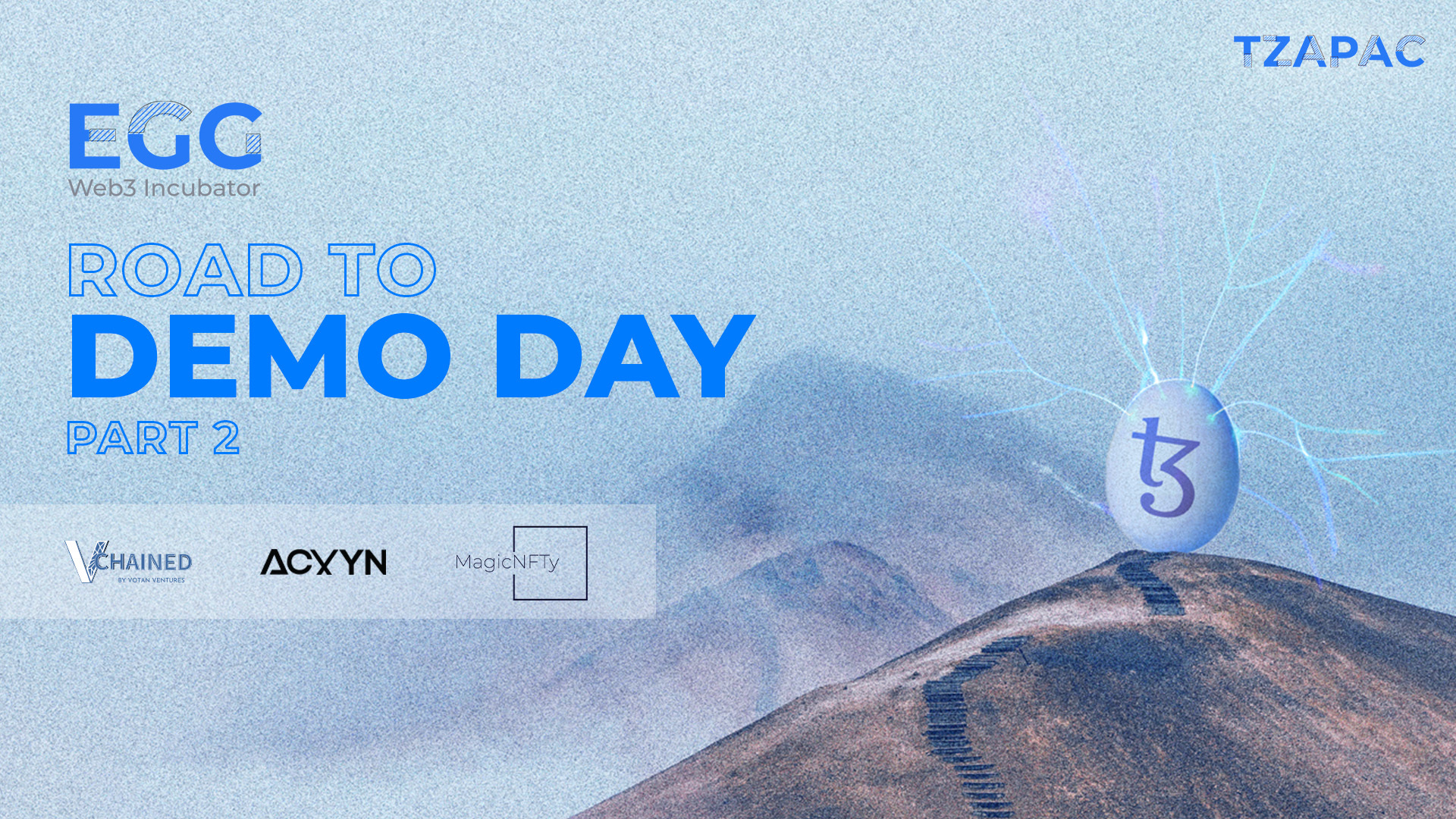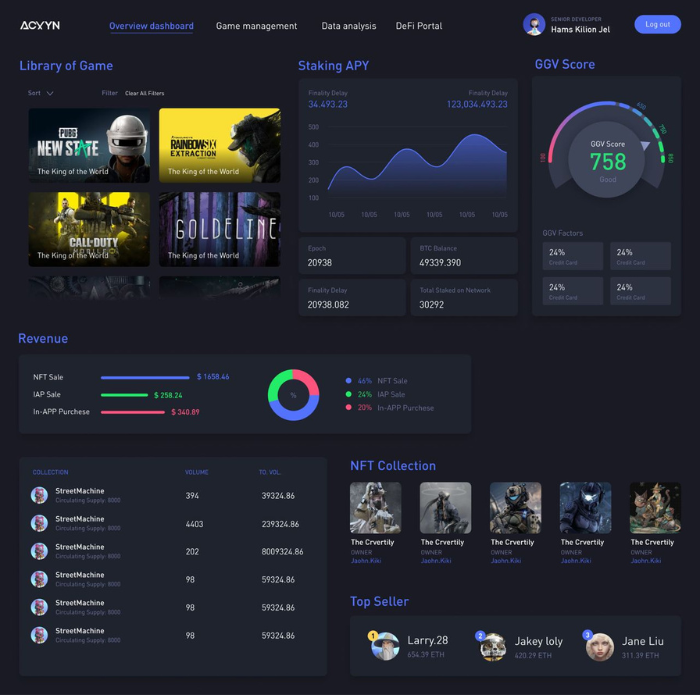IN
IN
JPN
EN
Join Our Communities

How can blockchain lead the charge against climate change, give indie game developers the funding they deserve, and change the landscape of content creation?
In the lead up to Demo Day, we highlight how VChained, Acxyn, and MagicNFTy can revolutionize these industries using cutting-edge Web3 solutions.
Projects Covered:
Read more about Part 1 here.

In 2020, global trade was crippled by the pandemic, exposing glaring holes in the supply chain industry. The next year however, a record-breaking $7 billion of investments poured in. What opportunities do VCs see in this space?
Fighting climate change requires fixing supply chains, which are responsible for 60% of all carbon emissions in the world. However, carbon footprints are impossible to track. Even regulation fails on a practical level. For example, India has imposed ESG reporting requirements for all companies by 2030, but companies do not even have access to that technology - until now.
VChained is pioneering a sustainable future for the supply chain industry, helping companies to achieve net zero emissions through blockchain-verified data. Its simple, no-to-low-code interface grants companies and consumers end-to-end traceability of products, carbon footprints and smart data insights. It is also highly-customizable, allowing users to easily build their own backend, enabling custom flows and logic.
Other technologies may also transform supply chains - from Internet of Things to hyper-automation (blending AI and machine learning) and next-generation robots. The best part? Blockchain can integrate them, enhancing supply chains with its signature interoperability, speed, and safety.
There’s no doubt that digitalization is much more efficient and traceable than paper records. But why use blockchain technology?
With digital databases, double-spending easily occurs. In addition, document forgery is still possible, like Hin Leong’s $2.23 billion in fraudulent disbursements.
Blockchain is decentralized and immutable. There is no risk of data loss, corruption, or data tampering. With VChained, a data entry creates a block, which is added on-chain and can be accessed simply by scanning a QR code. This heavily upgrades supply chains with next-level security; operational efficiency, and reduced costs.
In addition to what databases can check (prices, raw materials), VChained is also able to track other parameters like product quality, deliveries, invoices - and even carbon footprints. It can also identify specific weak links that databases can’t - for example, whether a product is missing because of an employee misplacing it or a stocktaking failure.
Traditionally, systems are siloed, which means that many different systems are used to track products at different stages of its lifecycle. VChained provides interconnectivity across:
Industries: While other products focus on one specific industry, VChained is cross-industry compatible, tying all these together in one ultimate solution.
Technologies: VChained provides convenience through effortless integration. Existing solutions can be integrated directly with their APIs, which means that full migrations aren’t needed. Automation of flows and IOT devices are linked, eliminating the need for manual entries and allowing for triggers through simple texts, phone calls, or sensors.
Learn how you can trace your business to a sustainable future with VChained.
— Votan Ventures (@votanventures) November 21, 2022
Explore the importance of traceability in the $50 trillion industry.https://t.co/Yr3uxQi0CN#votanventures #vchained #blockchain #blockchaintechnology #tezos #carbonfootprint #logistics #supplychain
Votan Ventures (VV)’s mission is to help the world trust what they buy with blockchain-powered transparent, efficient and sustainable supply chains.
The speed of which VV is building is impressive. In 2020 when VV was established, they’ve helped over 20 companies develop blockchain solutions from scratch, or migrate traditional processes over.
In 2021, VV competed with 500 startups to win the Microsoft Century program delivered by TZ APAC and Tezos India, designed to identify enterprise-ready blockchain solutions for industry specific use cases. After winning and receiving a grant, VChained was built. Today, a Minimum Viable Product (MVP) is out with a beta version already available for use.

Vijay Sharma, CEO, is a retired gazetted officer from the Department of Telecommunications, Government of India. With over 30 years of experience in managing the telecommunications supply chain, Vijay provides ever-reliable industry expertise to the team.

Rachit Gaur, CTO, immerses himself in blockchain. Since 2017, he has worked with tech giants and startups to solve enterprise-level problems, across 20 blockchains. He has delivered a document traceability solution for the French Government, written most of the code for Tatum, 5 different NFT marketplaces, built NPM libraries used by over 21 thousand projects, and more.

Filip Dite, Marketing Advisor, has extensive experience in Web3 marketing. He met Rachit during his time growing Tatum from the ground up as Marketing Head, where he was responsible for all campaigns and partnerships.
https://twitter.com/votanventures
https://www.instagram.com/votanventures
https://www.linkedin.com/company/votanventures
Acxyn is a GameFi start-up aiming to empower game developers with benefits such as novel cross-game compatible data and capital monetisation strategies. With a strong vision for the future of the gaming industry, Acxyn is committed to providing game developers with the Web3 tools they need to succeed. The first platform of its kind, Acxyn can potentially revolutionize the $235.7B gaming industry.
The typical independent game developer is a craftsman, passionate about delivering value and joy to the world through bringing his creative vision to life. He’s great at making games, but one problem exists - he’s not a businessman. Creating quality games and monetizing them are two entirely different core skill sets.
The truth is while 53% of all Steam games are indie, only 7% of indie games generate enough revenue to fund their next game.
This shows that while there is huge demand for indie games, monetizing their games is a huge challenge for developers. In order to survive, monetization has to be at the core of the game, inundating gamers with advertisements or in-game purchases. To gamers, the shift to this model is seen as greedy and cash grabbing.
Web3 technology offers an entirely new way for developers to make money off their product. But the challenge for developers are similar - they aren’t blockchain engineers nor tokenomic experts either. Acxyn is here to help.
In a nutshell, Acxyn utilizes Web3 technologies to provide developers with smart data, which is used to automatically tokenize game economies and intellectual property. With their Plug n’ Play infrastructure, game developers need zero knowledge of blockchain to reap all the benefits that Acxyn provides.
An intuitive, no-code dashboard which game developers can use to better manage their games

AI-Powered Data Tools
Acxyn’s Proprietary Valuation Algorithm is the backbone of their platform. It’s an aggregation of metrics like a game’s Daily Active Users, in-game transactions, amount of time spent, and more. The better a game’s score is, the more rewards developers and players will receive. Developers can also utilize this as feedback to make improvements, or as a credit score when raising funds from investors.
Based off this score, Acxyn’s no-code DeFi tools automatically tokenizes game assets, creating an in-game economy akin to a ‘micro-GDP’. It’s also possible for players to invest in games with potential to score highly in the future, which allows smaller developers access to early bootstrapping liquidity.
For all games, their tokens will be paired with a reserve currency which acts as an underlying asset class, leading to new revenue streams via Acxyn’s native DeFi Open Finance tools.
Commercialisation of Intellectual Property
Intellectual property valuation is important as it determines the total value of the game during M&A/purchase negotiations, or for financial reporting. It’s also critical during licensing agreements, when other games, shows or movies wish to pay game developers to use their IP. But just like how game developers aren’t businessmen, they aren’t lawyers either.
Acxyn not only handles the legal registration of IP for game developers, but also puts a token value in it based on the Proprietary Valuation Algorithm. Finally, indie games may benefit from licensing of IP - which is a huge profit driver for larger titles. This also changes the game for developers, through enabling undercollateralized lending and borrowing, and securing financing through pledging IP as collateral.

Acxyn’s team is a mix of great team chemistry, business intelligence and strong work ethic. Across the team, they’re equipped with unique and highly-specialized skill sets from business design, economic design, infrastructure architecture and development, marketing and operations.
The team is highly-experienced, being in traditional IT, Web3 hardware and software infrastructure, GameFi, and DeFi since 2015. They’ve launched several NFT and GameFi projects, and designed/developed multiple product and token ecosystems.
Despite being a true pioneer in this space, Acxyn has made incredible progress since they were founded 3.5 months ago. 60 game development studios have already signed their interest in being part of Acxyn’s launch, including Virtuous, Streamline, Agate, and Quurk.
They will be presenting their MVP at Demo Day, 7 December.
https://www.linkedin.com/company/acxyn/about

MagicNFTy is a no-code community management tool, which allows influencers to easily harness blockchain technology. With MagicNFTy, content creators can easily create brand tokens, token-gate their content, and manage their communities. This provides a new level of control and transparency for content creators and ensures that they are fairly compensated for their work, and gives them full ownership over their content.
Today, the creator economy is worth a whopping US$104.2 billion.
In an industry that shows such rapid year-on-year growth, it’s not surprising that in 2022 alone $2.7B has been invested into startups in the Creator Economy. Currently, 23 of these startups are valued over $1B - and of these, 14 have crossed this milestone in 2022.
These statistics suggest that for Creator Economy Startups, the time to thrive is now.
Social media platforms are too centralized
Platforms, not creators, are the ones taking the lion’s share of the money. MagicNFTy uses NFT technology, and royalty smart contracts to allow creators to directly monetize their content..
Content is ultimately dictated by the algorithm that social media platforms use
Algorithm-fed short video content is powering social media right now. This means that creators have to focus on chasing what the algorithm wants, instead of creating quality content. With MagicNFTy, creators can truly create for their community instead of catering to algorithms.
Web3 enabled landing pages
Creators may build a “wall” to showcase their creativity or products. This is where all the content is
posted and engagement happens.
Online storefronts
MagicNFTy makes it easy for creators to sell products like merchandise or tickets, without leaving the
platform.
Minting NFTs
Creators can mint their work into NFTs, benefiting from not just the initial sale but also royalties when
they are traded on the secondary market.
Token-gated content and products
Through NFT technology, creators can provide a personalized experience to all their fans. Different NFTs
will give different levels of access to the creator.
Community management and analytics tools
Creators can easily manage community engagement - staying connected through things like airdrops and chat
platforms.
Brand tokens
Creators can reward their communities for their engagement in an impactful and authentic way.

Having plied his trade in the PR arena, Aditya is well-versed in the content creation industry. More recently, he’s been in the product team for a conversation AI startup. At MagicNFTy, Aditya focuses largely on product development, which spans client interviews, creating UI/UX, and business development.
"I enjoy finding solutions to issues and working on projects that could affect how we go about living our daily lives. I think that creating products that are easy to use and don't require the user to spend extra time learning new things would revolutionize the world." - Aditya
On 15 September, TZ APAC kicked off the EW3I where 23 teams from 8 countries were chosen for their incredible potential to create real-world Web3 solutions.
Get an overview of these 23 projects here: The 23 Projects on Tezos Changing the Game: Inside Cohort 1 of the TZ APAC EGG Web3 Incubator
The EW3I provides these budding projects with access to resources and support including:
Demo Day will see the project founders participate, where they will be given 3 minutes to present their pitch to some of industry’s top mentors and investors participating.
These investors will then make their assessment - of the project’s quality and potential, business strategy, and even the founders themselves. Investors will include high-profile figures from esteemed organizations like Newman Capital, Draper Startup House, Amber Group, Samadhi Ventures.
The mentors in attendance include Vikram Bharati (Draper Startup House), Laurent Dedenis (Chainstack), Cici Lu (Vennlink), Bobby Ong (CoinGecko), Mona Zoet (RegPac Revolution), TZ APAC’s own Julian Low, and many more.